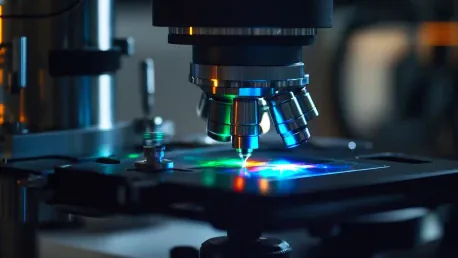Honeywell has unveiled a transformative technology named Digital Holographic Microscopy, integrating artificial intelligence (AI) to revolutionize the counting and classification of minute particles or cells. This innovative technique is poised to make a substantial impact across various industries, enhancing swift analysis and streamlining operations where rapid results are crucial.
Healthcare Applications
Transforming Infection Diagnosis in Peritoneal Dialysis
In the healthcare sector, Digital Holographic Microscopy stands out for its potential to expedite the treatment process for patients undergoing at-home peritoneal dialysis, a procedure that makes them susceptible to abdominal infections. Traditionally, diagnosing these infections involves a time-consuming 1-2 day period due to mandatory lab-based analysis. Nevertheless, with Honeywell’s cutting-edge technology, image capturing of dialysis fluid can occur immediately at the point-of-care using a portable device equipped with a laser, an imager sensor, and a disposable microscope slide. AI algorithms then swiftly analyze these images to detect infection-indicating white blood cells, thereby enabling healthcare providers to administer quicker and more effective treatments for patients.
Sarah Martin, president of Honeywell Sensing Solutions, underscores the growing demand for rapid and precise solutions in healthcare, stressing that innovations like Digital Holographic Microscopy can significantly improve patient outcomes and systemic efficiency. This technology’s capacity to deliver near-instantaneous results could prove vital in scenarios where time is of the essence, providing a lifeline for patients and relieving strain on healthcare systems. Moreover, the ability to perform these analyses outside of traditional laboratory settings empowers healthcare professionals with more autonomy and flexibility, ultimately enhancing the quality of patient care.
Machine Learning and Biological Sample Preparation
Digital Holographic Microscopy generates high-resolution images without the need for complex and costly lenses typically associated with conventional microscopes. It operates by transmitting light through a sample to create hologram images, which are subsequently processed by computational algorithms to render detailed interpretations. This method allows a simple yet highly effective instrument design, making it ideal for point-of-use testing and analysis. Additionally, machine learning algorithms play a crucial role in differentiating cell types without the necessity for staining, which simplifies biological sample preparation and expedites the diagnostic process.
The integration of machine learning into this technology represents a significant leap forward in the realm of medical diagnostics. Not only does it streamline workflows by eliminating the cumbersome steps involved in traditional staining methods, but it also reduces the margin of error associated with human analysis. This convergence of AI and machine learning promotes a more efficient, reliable, and accessible diagnostic tool for healthcare practitioners. Honeywell’s dedication to incorporating advanced computational techniques into their innovation exemplifies a broader commitment within the industry to embrace automation for improved patient care.
Environmental and Industrial Applications
Ensuring Air Quality and Safety
Beyond healthcare, Digital Holographic Microscopy holds significant promise in environmental applications, particularly in monitoring air quality. The technology can analyze air pollutants, ensuring safer indoor air quality in various settings, from commercial buildings to industrial environments. By capturing detailed images of particulate matter in the air, the technology can provide real-time data on pollution levels, helping authorities take proactive measures to mitigate adverse health effects among the population. This application is particularly relevant in urban areas where air pollution is a persistent concern, offering a tangible solution to monitor and manage air quality effectively.
Furthermore, the ability to conduct such analyses rapidly and on-site represents a monumental advantage. Traditional air quality monitoring entails sending samples to specialized labs, navigating logistical challenges, and waiting for results. Honeywell’s solution circumvents these limitations, providing immediate insights and equipping stakeholders with actionable data. Consequently, this not only safeguards public health but also aids in compliance with regulatory standards, reinforcing environmental protection efforts.
Monitoring Liquid Samples for Quality Assurance
Digital Holographic Microscopy incorporates artificial intelligence (AI) to fundamentally change the way tiny particles or cells are counted and classified. This revolutionary technique is set to have a significant impact on multiple industries by improving the speed and accuracy of analysis while simplifying operations that rely on quick results. By utilizing AI, the technology enhances the efficiency of processes that depend on rapid particle or cell assessment, making it invaluable in fields where timely and precise outcomes are essential. Honeywell’s innovative approach aims to streamline workflows and provide accelerated, reliable data that can drive decision-making in real-time scenarios, further underscoring its potential to transform industry standards and operations. The implementation of this advanced microscopy technique represents a significant leap forward in analytical capabilities, offering a robust solution that addresses the growing demand for faster and more accurate testing.









